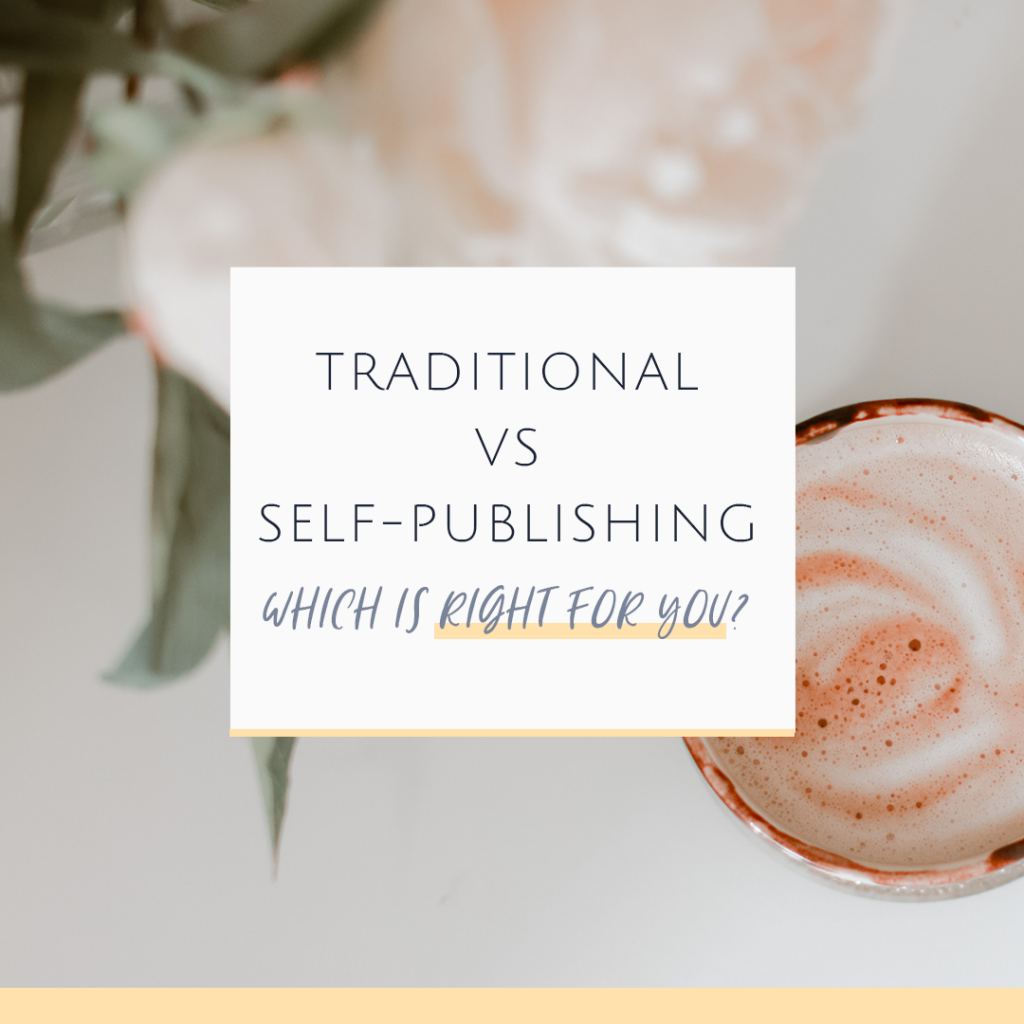Finished that novel? Amazing – so what’s next?
Yup – you want it to be published.
You’ll see two types of author, those who have been traditionally published, and those who have self-published.
Which is best for you?
Let’s look at the pros and cons of both so that you can make an informed decision.
Self-Publishing
Pros
When it comes to self-publishing there are a few things that make it super attractive.
The first? You are definitely getting published.
That’s a given. Your book is going to be available for other people to buy.
You will also be able to choose all of the elements – the cover, the blurb, the photograph of you on the inside. You’ll get to choose the title, how the book looks, and basically everything about it.
I mean that’s pretty awesome, because it is, after all, your book.
There are also so many easy ways to self-publish these days! There’s the obvious – Amazon – who take you through the process very easily, providing templates etc, and giving you options to order a copy for proof-reading.
You can also choose to publish through other vendors, and you may even be able to get your book into bookstores and libraries. Wattpad also gets an honourable mention as an easy way to self-publish to ready to read readers!
You hold the rights! This is a big one for authors and is not always the case in traditional publishing deals.
The history of people who have self-published is impressive.
Did you know that Beatrix Potter couldn’t get her Peter Rabbit stories published in the way she wanted, so she self-published them?
There are also many success stories of authors who started off self-publishing and now have films made of their books, not to mention traditional publishing houses banging on the door to publish their next work.
This genuinely does happen, but it is not a common occurrence.
Self-Publishing
Cons
Alright, now you’re all fired up to self-publish, let’s have a chat about the cons, because there are some.
Self-publishing means that you’re going to have to do all the marketing. Now, you might love that idea, and have thousands of followers online already, just waiting for the drop of your novel. However, you may not.
Marketing takes a lot of time and effort. Going beyond the actual creation of marketing material, posters, etc, it’s worth remembering that the self-publishing market is heavy with people trying to get you to buy their book. So how are you going to stand out and get noticed?
It’s worth considering writing a marketing strategy. Unfortunately, just having it available to buy online will not equal any sales.
Do you have the time to promote your novel?
Are you willing to put in the hours for a goal that is not necessarily attainable? These are things that are worth evaluating. I would also hazard to ask whether you buy independent self-published books yourself. The self-publishing industry only works if readers are willing to buy self-published works – so if you want to self-publish but don’t currently read other peoples books in this category, I would suggest starting, reading and reviewing!
Money. You are responsible for the costs of everything. It may be that you don’t spend any money and just want to market etc without sponsored posts, hiring marketing people, etc. However, marketing is one of those things that works better when money is involved – for example, social media as a whole is now more pay to play than anything else.
It’s worth chatting to others who have had success self-publishing and working out what they have done right, and how much it would cost you to do the same.
It’s worth considering whether you ever want the novel you have written to be traditionally published.
A lot of agents and publishers will not publish something that has already been published, and this includes making a novel available to people in general (for example, if you put something on your website and people can download it, it’s less likely to be published in the future).
Traditional Publishing
Pros
Traditional publishing is often spoken of in awed tones, and this is for good reason.
I see it as a sort of golden gate, and a few select people hold the key to the door.
This is problematic for a few reasons – the subjectivity of enjoying a novel, unconscious bias, etc. However, if one writes to an agent, gets selected, and eventually published, there are pros to be enjoyed!
Money. Yep. They give you money for your work, the work you’ve already done, and you don’t need to worry about paying for sponsored posts because it is in their interest to market your novel. You can share your delight on social media, trust that your book is going to end up in the right places and enjoy signing events that are organised on your behalf.
The main thing is you don’t have to worry about whether your book is going to sell – this is your publisher’s job now. You can start writing that next novel.
Once you’ve been accepted into the traditional publishing ring, you will often find it easier to get published from that point on. Your agent may ask you what’s in the pipeline, and you could even get an advance.
Many doors are opened once you are traditionally published, from lecturing positions to conferences and speeches at book fairs. This might not be your idea of fun, but it certainly becomes attainable.
Traditional Publishing
Cons
The odds are not in your favour. The odds of getting a literary agent are 1 in 1000 (according to JerichoWriters.com). Of those who have completed a manuscript, around 23% achieve the status of traditionally published (Medium.com/publishizer). Phew, I know. But listen, it’s not impossible, and it does happen. This is obviously the main con of traditional publishing – nothing is guaranteed.
Money. Hang on a minute – didn’t I say…? Yes! But wait. You’ll get lower royalty rates if you are traditionally published than if you self-publish.
Now you may not mind this, and it depends too on how much you were going to spend on self-publishing, but it’s worth a mention.
You usually don’t get to decide what your cover looks like, what the blurb is, the title of your book, how they will market it, and more. This can be painful if you have a vision for your work and your publishing house decides that it’s going to be something completely different. Overall, once you sign the contract, they have the final say.
It can take up to two years for a book to be published from the time it is accepted. That’s a long wait to hold your novel in your hands.
You may not hold the rights to your work anymore. It’s worth really inspecting that fine print and working out what it means for you and your work.
A Note on Publishing
Whatever you decide to go for, please remember this one golden rule.
You have the goods, and should be paid for that. If you send your work off to a publishing company and they respond asking for an upfront payment, just run away. They are not legitimate, and are a vanity publisher. This could cost you thousands, and you’d still be lumped with the marketing on top of it. It’s never worth it.
Already contacted a publisher and wondering whether to chase?
Check out this blog post on following up with an agent or publisher!
Want to chat more about publishing, or have any other questions?
Get in touch or book a Discovery call











